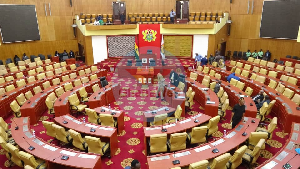The 8th Parliament of Ghana, set to dissolve on January 6, 2025, will be remembered for its unique composition, dramatic moments, and significant legislative actions.
Its status as a "hung" Parliament, split equally between the New Patriotic Party (NPP) and the National Democratic Congress (NDC), with one independent MP, Andrew Asiamah Amoako, created a tenure filled with unprecedented events and debates.
Here are some key highlights:
Composition and Leadership Drama
The equal representation of the NPP and NDC created a delicate balance of power, with the Member of Parliament for Fomena Constituency, Andrew Asiamah Amoako, holding the deciding vote.
This dynamic led to drama right from the start, beginning with the election of Alban Bagbin as Speaker of Parliament.
A veteran NDC politician, Bagbin's election was marked by chaotic scenes, including physical altercations, ballot box snatching, and military intervention in the Chamber.
His assertive leadership style often brought him into conflict with the Executive, becoming a defining characteristic of the 8th Parliament.
Although Bagbin's capabilities were undisputed, having an opposition member as Speaker while the NPP was in power was unprecedented.
The 8th Parliament also made history by electing Andrew Asiamah Amoako as the Second Deputy Speaker, the first time an independent candidate occupied this role.
Amoako, who had previously contested and won the Fomena seat on the NPP ticket, was sacked from the party after filing to run as an independent candidate in the 2020 elections.
The First Ballot Theft
During the vote to elect the Speaker of Parliament, Carlos Ahenkorah, MP for Tema West, dramatically snatched ballot papers while counting was ongoing and fled with them.
He was apprehended by other MPs who prevented his escape. The NPP ultimately lost the vote to Bagbin.
Approval of Ministerial Nominees
The hung Parliament exposed cracks in party loyalty, even during the approval of ministerial nominees such as Bryan Acheampong (Minister of Food and Agriculture), Kobina Tahir Hammond (Minister of Trade and Industry), and Stephen Asamoah Boateng (Minister of Chieftaincy and Religious Affairs).
Despite official opposition from the NDC, some Minority MPs voted in support of the nominees, an act seen as a betrayal that reflected the difficulty of maintaining discipline in such a precarious political balance.
Passing of Major Legislation
Despite its divisions, the 8th Parliament managed to pass key legislation. The Narcotics Control Commission (Amendment) Act, 2023, which legalized the cultivation of cannabis for industrial and medicinal purposes, marked a significant step in reforming Ghana's drug policy.
The E-Levy Controversy
The debate over the Electronic Transfer Levy (E-Levy) in 2022 was among the most divisive moments of the 8th Parliament.
The levy, a 1.5% tax on electronic financial transactions, sparked widespread public outcry. The Minority staged a walkout during its approval, leaving the bill to pass without their participation.
LGBTQ+ Bill Debate
The "Promotion of Proper Human Sexual Rights and Ghanaian Family Values Bill" became a focal point of national and international attention.
Known as the anti-LGBTQ+ bill, it provoked some of the most intense debates in Ghana's legislative history. The bill, which was eventually passed, polarized opinions on human rights and traditional values within the country.
Vacant Seats and Legal Battles
The declaration of four parliamentary seats as vacant by Speaker Bagbin also became a contentious issue.
The affected MPs had chosen to "cross the carpet" by filing to contest the December 7, 2024, elections in different capacities, either as independents or on other party tickets.
The seats involved included those held by Cynthia Morrison (Agona West), Kwadjo Asante (Suhum), Andrew Amoako Asiamah (Fomena), and Peter Kwakye Ackah (Amenfi Central).
The Supreme Court eventually ruled that Speaker Bagbin’s actions were unconstitutional, emphasising the importance of due process in declaring seats vacant.
This landmark ruling reinforced the judiciary's role in safeguarding constitutional governance and ensuring fairness in legislative procedures.
As the curtain falls on this historic Parliament, its legacy of dramatic events and critical legislative contributions will remain a pivotal chapter in Ghana's political history.
JKB/MA
Watch as the Transition Team briefs the public on final preparations for Mahama's inauguration below:
Politics of Monday, 6 January 2025
Source: www.ghanaweb.com
Drama, divisions and legislative milestones that marked Ghana's 8th Parliament
Entertainment












